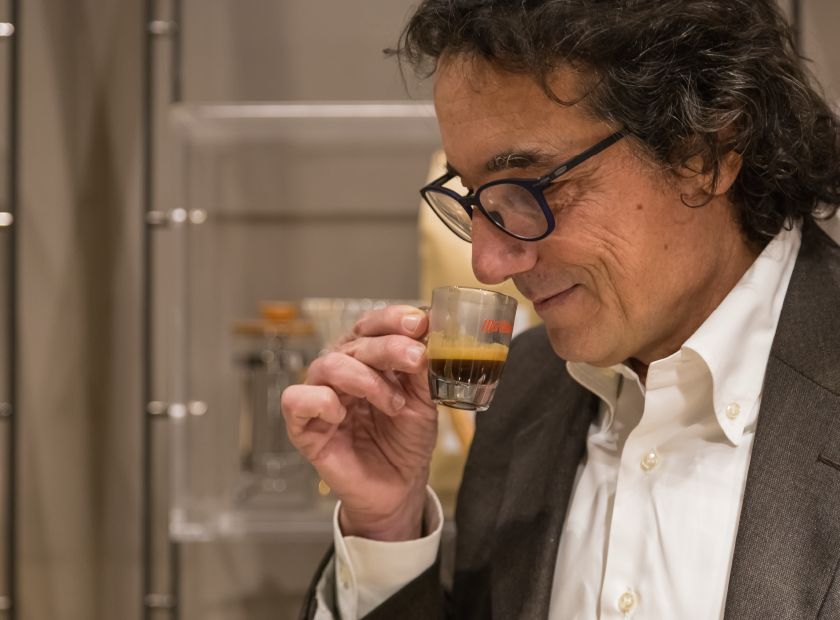
The ritual of full-flavoured, deep, fragrant coffee has spanned over four generations at a slow, inexorable pace. Ancient, brand-new, deeply ingrained but cosmopolitan, transformational, enjoyable coffee: Morettino, from Palermo to the world at a slow pace. Arturo, Angelo, Alberto, Alessandro, Andrea... their names only begin with A. And, as Andrea Morettino tells, it happened almost by chance, just the way things happen, the way traditions begin. Four generations of capital A with a unique passion: the black gold of Italian morning awakening, which is not Italian (actually: it was not...), namely, coffee. It all started at the Spezie e Coloniali shop in San Lorenzo ai Colli, a residential area of Palermo. In Sicily, in the 1920s, coffee was just one of the odd things in the shop. It was Arturo who began nurturing the passion. A tireless worker, he made blends, tried methods and created the coffee roasting business. In a historical period when cafés were the venues for culture, meetings, and social life, he managed everything: the roasting, blending, delivery and public relations until the ‘80s, when his children began helping him by entering the company.
They were revolutionary concepts in the ‘80s
Actually, we have a natural eco-sustainable vocation. We have used the slow dry process and, for ten years, have produced organic blends. Thirty years ago, we adopted eco- friendly hot and clean air roasting. Our packaging, the Morettino green project, is eco- sustainable. However, the real revolution is getting back to the coffee ritual, which means sharing and awareness. That’s why we’re aiming to develop a new – better yet renewed – coffee culture. Hence, the school, the museum, the tastings and the coffee experiences. Because there’s not a single type of coffee, there are scores: there’s the robust, fragrant morning coffee, a routine requiring a strong, full-bodied blend, precisely meant for the Moka pot. It’s fine with the mid-morning or afternoon espresso, but in the evening, you need a smooth, elegant coffee in a hot cup to hold in your hands, with a note of pleasure, best obtained with an American-style filter. And this means to know coffee and dedicate time to it. We also do catering training, in short: a cup of coffee is the icing on the cake at the end of a dinner. It takes sensitivity. To develop it, we’ve also tried the Coffee Mixology format. After all, the cappuccino is a ‘cocktail’ that has allowed coffee to spread worldwide.
Well, we have always drunk coffee and zammù [a traditional Sicilian anise- flavoured spirit like Ouzo and Pastis] And the corrected coffee in northern Italy, and the Irish coffee everywhere. Just look around to realize these things exist. All we have to do is enhance them and experiment with them.
And plant seeds... Dad is a passionate visionary. Professor Inglese gave him the seeds from the Botanical Garden of Palermo. He had coveted them, but he was not that sure it could work. And yet, they had sprouted in the greenhouse of the Botanical Garden – they had arrived from Ethiopia at the beginning of the 1900s. After being planted, not all seeds germinated. Then, we observed, tested, and tasted the coffee plants of our garden for years, until 2020. In that year, the climate was crazy and tropical-like: scorching heat and sudden torrential rainfall damaged the plants, but there were even double blooms. Eventually, in the year of the centenary, nature gave us back all the love we had given to it over time. We experienced overwhelming emotions.
But the crazy climate is worrying us... Nonetheless, other opportunities have stemmed. This, too, is respect for nature: working to regenerate it but even going along its pace, in every sense. In Sicily, kiwi, mango, and avocado trees have been cultivated for years. It’s a perspective that might bring young people back. I myself came back to the roasting coffee business after a long, national and European path. We’ve involved the University of Palermo, researchers, and tasters in our Made in Sicily coffee project. It’s not about resisting but regenerating and starting from the "old" land to find a new culture.
Then, a new life for farming? The same way earth and coffee does. But, do you know that our coffee tastes like carob and white Plumeria? That it has hints of Muscat of Alexandria? People say "bitter coffee", but the right question is: "what coffee?" Coffee hasn’t a thousand aspects. It‘s the product of a thousand things that depend on its origin, botanical species, harvesting technique, up to roasting and blending processes, and extraction method. Dad never calls it ‘bitter’ because ‘bitter’ is already a quality of coffee, of some coffees actually. When coffee is good and well processed, you don’t need to add sugar!
What other threats besides sugar? Speed. It takes time to cultivate, prepare, and consume coffee. The single portions, the espresso and some industrial processes ruin it, make it unhealthy, sicken and make it die. As my grandfather used to say: for a cup of coffee, you need science and conscience, which means a supply chain controlled by the growers at the next steps. And that's why we’re spreading the culture of good coffee for conscious consumption, so that innovation could turn into something positive.
You are present in more than forty countries, five generations, and countless blends: what is your secret? We are interested in the seasoning of green coffee, slow roasting and seasoning of roasted coffee – which can change everything like the Barrique method in winemaking – and cold grinding, slowness, and conviviality. We are curious, have fun. We are in love. Coffee is a world of relationships. We are a family.






